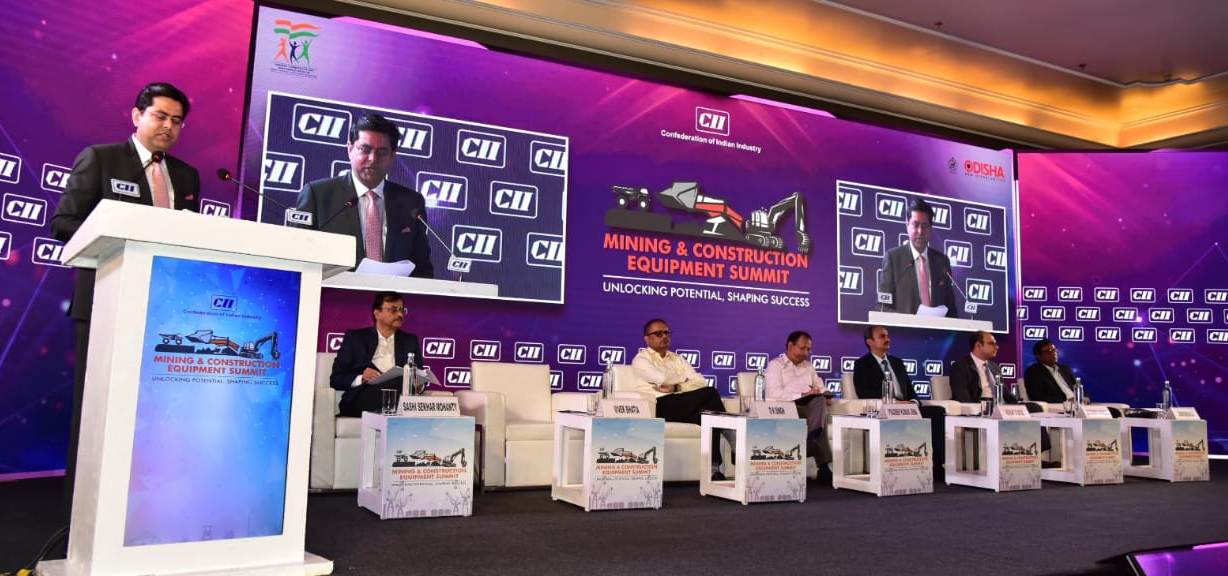Bhubaneswar: Emphasizing the pivotal role of the mining sector in the socio-economic development of the State, Chief Secretary Pradeep Kumar Jena today said the mining revenue is growing in the State.
Addressing the National Level CII Mining and Construction Equipment Summit here, the Chief Secretary said over the past three years, the State has seen a significant increase in mining revenue, from Rs 10,000 crore to Rs 49,000 crore in the last year. He expressed the commitment to continue this positive trend as it is crucial for the State’s growth.
Shri Jena extended an invitation to investors to participate in the State’s development. He also highlighted the various incentives offered in the Industrial Policy Resolution (IPR). Odisha has ambitious plans to become a 100-million-ton steel-making state by the end of this decade, and many major players in the aluminium industry have set up units in the State.
These developments will lead to increased mining activities, making it imperative for all stakeholders to prioritize sustainable and environmentally friendly mining practices, the CS said.
During the summit, Secretary, Ministry of Road Transport and Highways Anurag Jain discussed infrastructure development in the country. Mentioning that the logistic cost gets 14% of the national GDP in comparison to the international standards of 8%, he called for the urgency of the policy to mitigate the cost and advocate for establishing Research and Development Centres in India.
Principal Secretary Industries, Hemant Sharma highlighted the political stability and skilled workforce in the State, making it an attractive destination for investors.
Odisha ranked 2nd in the country in attracting investment of Rs 20.1 lakh crore in FY ’23 and 3rd in attracting bank-assisted investment proposals in the same period of time, Shri Sharma said.
Saying that, Odisha produces 13.8% of the total value of mineral production in the country he outlined, the mining & metallurgy sector contributes more than 13% to the GSDP of the state.
Steel manufacturing in the State will increase into 138 MMT in 2030 from the current capacity of 34 MMT. Similarly, the Aluminium production capacity tends to grow to 3.84 MMT in 2030 from the current capacity of 2.64 MMT.
Besides this he mentioned about the Long-Term Linkage Policy of minerals. The Principal Secretary stressed on the significant contributions of mining and industry to the Gross State Domestic Product (GSDP), with 13 percent and 40 percent, respectively.
Odisha’s infrastructure projects have been strategically planned to connect road, rail, ports, and pipelines with the mineral and industrial sectors of the state, he added.
Additional Chief Secretary, Steel & Mines, D K Singh made the audience aware about the concern of the environmental depreciation and talked about sustainability and the intergenerational equity and suggested the mining stakeholders to use the efficient infrastructure promoting eco-friendly mining.
CII Eastern Region Chairman Shiv Siddhant Narayan Kaul acknowledged the joint efforts of the Government of Odisha, CII, and industries in removing regional bottlenecks to facilitate investment. He emphasized the need to not only focus on “Make in India” but also on global exports. Kaul also highlighted the competitive advantage of skilled labour with low labour costs in Odisha.
Vivek Bhatia from CII emphasized the global significance of the mining and construction industry, which was valued at $121 billion in 2021, with the Asia-Pacific region contributing $62 billion.
He pointed out the sector’s potential to reach $190 billion by 2028, with a growth rate of 2.8 percent per year. Bhatia underlined the sector’s role in realizing India’s vision of a 5 trillion-dollar economy and the employment opportunities it provides, with 3.5 million people currently employed in the mining sector.
In the Eastern part of India, seven states significantly contribute to mineral production, with Odisha leading the way at 42 percent, followed by Chhattisgarh and Jharkhand with 17 percent and 4.3 percent, respectively.


